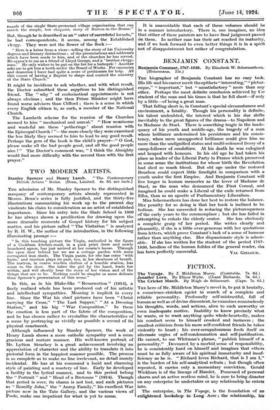BENJAMIN CONSTANT.
Benjamin Constant, 1767-1830. By Elizabeth W. Schermerhern. (Heinemann. 25s.) Benjamin Constant, 1767-1830. By Elizabeth W. Schermerhern. (Heinemann. 25s.) THE biographer of Benjamin Constant has no easy task. His life and his career merit the epithets " interesting," " pictur- esque," "important," but " unsatisfactory " more than any other. Perhaps the most definite conclusion achieved by t'm student of the man and his times is that he fell short—if only by a little—of being a great man.
That falling short is, in Constant's special circumstances and environment, a fatality. Though his personality is definite, his talent undoubted, the interest • which is his due shifts inevitably to the great 'figuresof the drama—to Napoleon and to Madame de Stael. There is something tragic in the inade- quacy, of his youth and middle-age, the tragedy of a man whose brilliance undermined his persistence and his consis- tency, when mere unsupported brilliance could give him no more than the undignified status and multi-coloured livery of a camp-follower of -condothere. At his death he was eulogized and heaped with honours. In his old age he had taken his place as leader of the. Liberal Party in France which preserved in some sense the institutions for whose birth the Revolution had shed so much blood. But old age-under the restored Bourbon could expect little limelight in comparison with a youth under the first Empire. And Benjamin Constant will live longer in human memories as the lover of Madame de Steel, as the man who denounced the First Consul, and imagined he'_could make a Liberal of the exile returned from Elba, than as an apostle of Parliamentary Liberalism.
Miss Schermerhorn has .done her best to restore the balance. Her penalty for so doing is that her book is inclined to be tedious. She has succeeded in reducing the picturesqueness of the early years to the commonplace ; but she has failed in attempting to enhalo the elderly orator. She has obviously a complete graSp pf her period. She writes clearly and pleasantly, if she. is a little over-generous with her quotations from letters, which prove Constant's lack of a sense of humour rather than anything else. Her dispassionate style is admir- able. If she has Written for the student of the 'period 1767- 1830, heedless of the human foibles of =the general reader, she










































 Previous page
Previous page